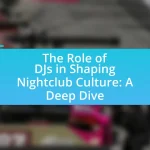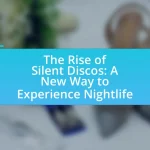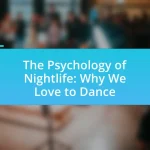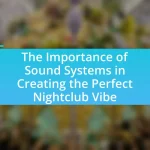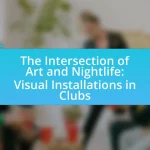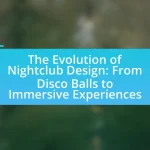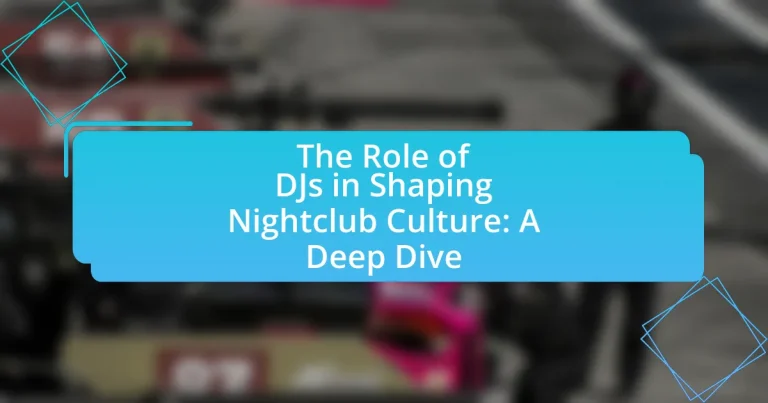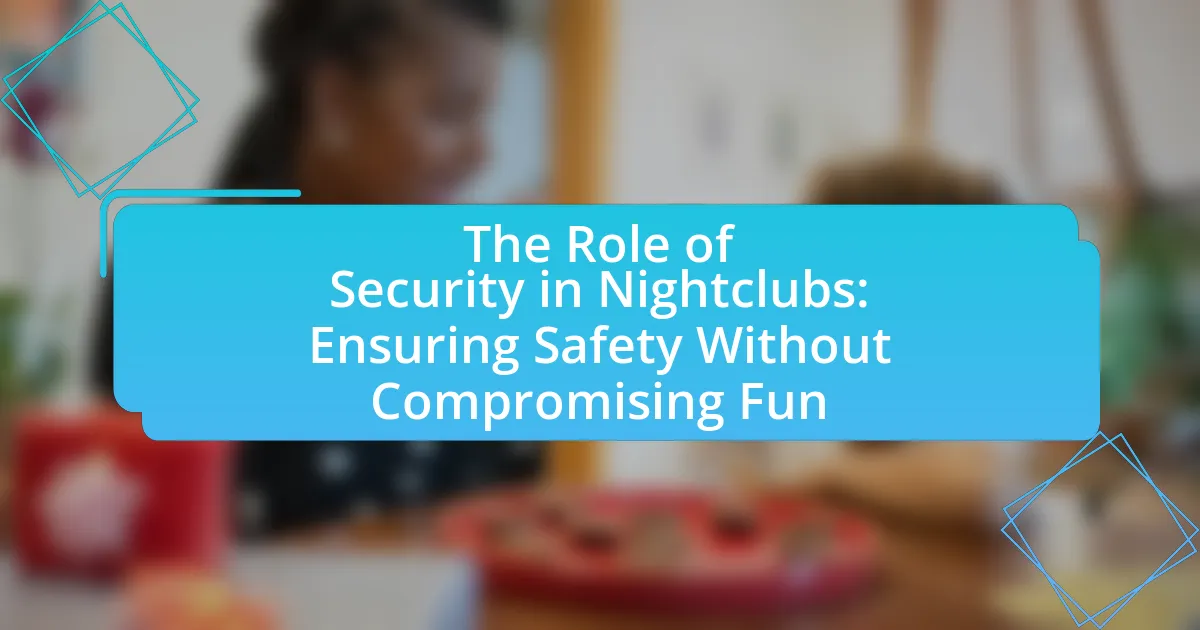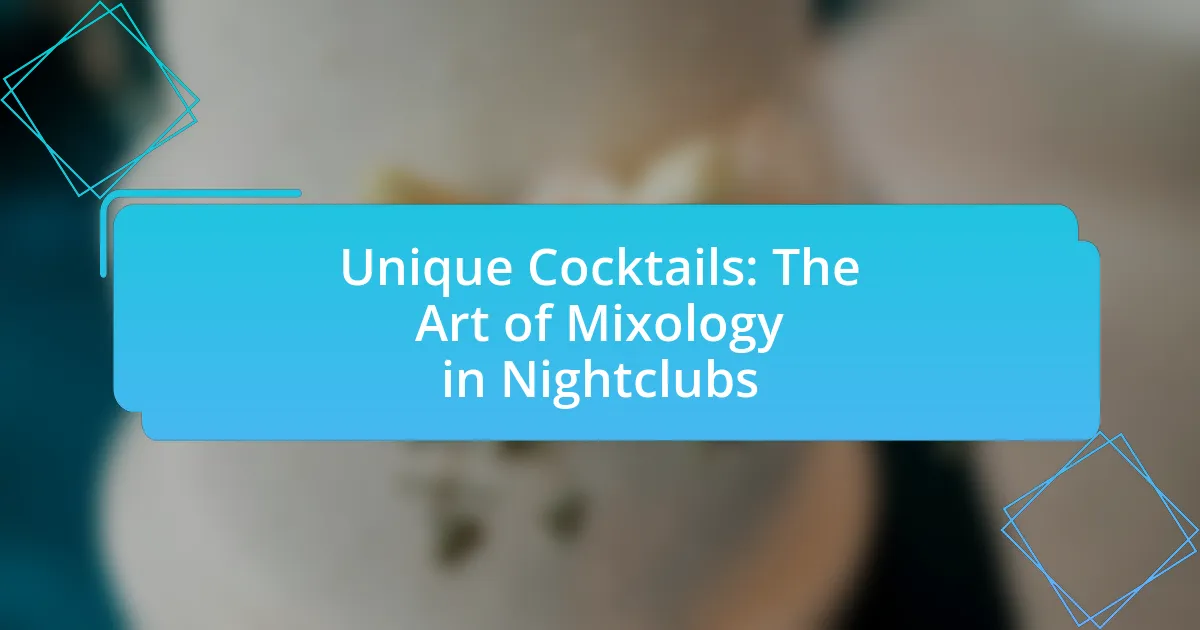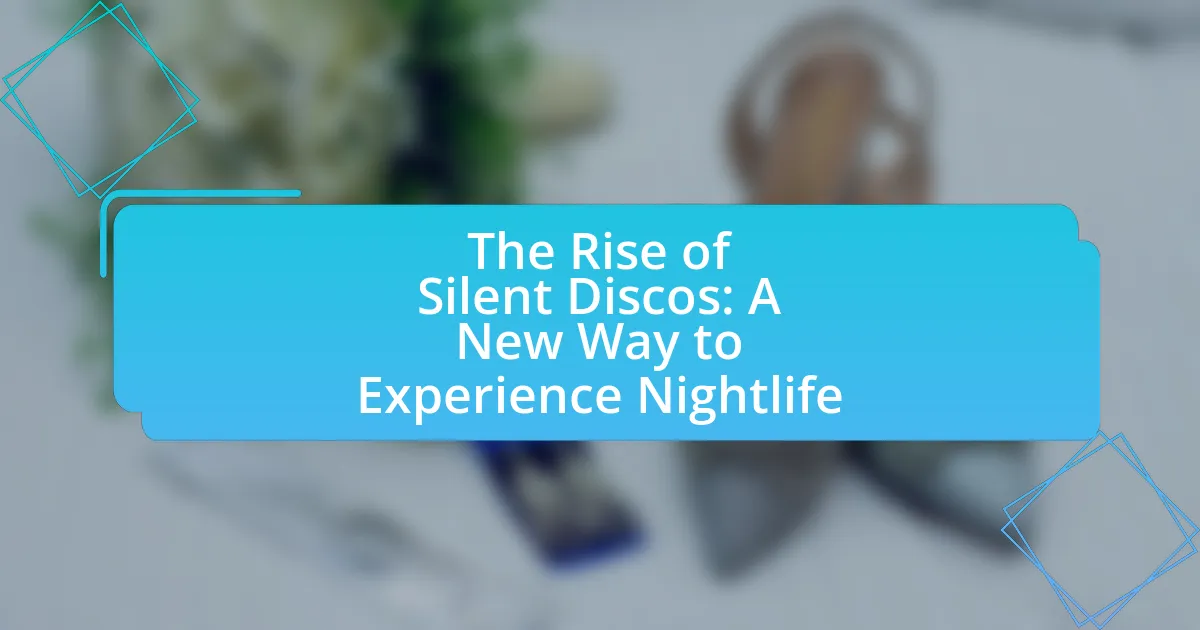The article examines the pivotal role of DJs in shaping nightclub culture, highlighting their influence on music selection, atmosphere, and audience engagement. It discusses how DJs curate and mix tracks to create a communal experience, utilizing techniques such as beatmatching and crowd reading to enhance energy levels. Additionally, the article explores the challenges DJs face, including competition and the need for technical proficiency, as well as their impact on music trends and the branding of nightclubs. Through collaboration with venue owners and promoters, DJs not only attract patrons but also contribute significantly to the overall nightlife experience.
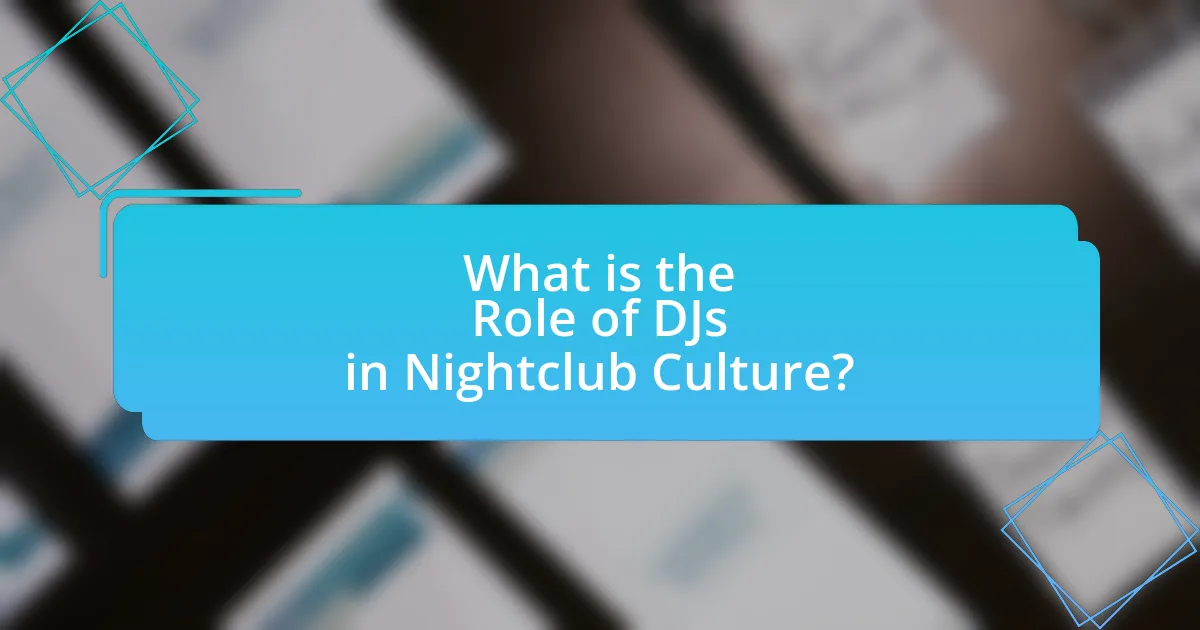
What is the Role of DJs in Nightclub Culture?
DJs play a crucial role in nightclub culture by curating and mixing music that creates an engaging atmosphere for patrons. They are responsible for selecting tracks that resonate with the audience, maintaining energy levels, and facilitating a communal experience through music. This role is supported by the fact that studies show music significantly influences mood and social interaction, making DJs essential for enhancing the nightlife experience. Additionally, the evolution of DJing technology, such as digital turntables and software, has allowed DJs to innovate and shape musical trends within the nightclub scene, further solidifying their importance in this cultural landscape.
How do DJs influence the atmosphere in nightclubs?
DJs influence the atmosphere in nightclubs by curating music that sets the emotional tone and energy level of the venue. Their selection of tracks, mixing techniques, and ability to read the crowd directly impact the overall experience, creating an environment that encourages dancing and social interaction. Research indicates that the tempo and genre of music played can significantly affect patrons’ moods and behaviors, with faster beats often leading to increased energy and engagement. For instance, a study published in the Journal of Consumer Research found that upbeat music can enhance feelings of excitement and happiness, which are crucial for a vibrant nightclub atmosphere.
What techniques do DJs use to create a unique vibe?
DJs create a unique vibe through techniques such as beatmatching, mixing, and utilizing effects. Beatmatching involves synchronizing the tempo of two tracks to ensure a seamless transition, which maintains energy on the dance floor. Mixing allows DJs to blend different songs, creating a continuous flow of music that keeps the audience engaged. Additionally, DJs use effects like reverb, delay, and filters to enhance tracks, adding depth and texture to the sound. These techniques are essential in crafting an immersive experience that resonates with the crowd, as evidenced by the fact that successful DJs often cite their ability to read the audience and adapt their set accordingly as a key factor in their performances.
How does the choice of music affect the crowd’s energy?
The choice of music significantly influences the crowd’s energy by setting the emotional tone and driving the overall atmosphere of the event. Upbeat and fast-paced genres, such as electronic dance music, tend to elevate energy levels, encouraging dancing and interaction among attendees. Conversely, slower tempos or more subdued genres can create a relaxed environment, leading to lower energy engagement. Research indicates that specific musical elements, such as tempo and rhythm, directly correlate with physiological responses, such as heart rate and adrenaline levels, which in turn affect crowd behavior and energy. For instance, a study published in the Journal of Consumer Research found that faster music increases the pace of movement and enhances feelings of excitement, demonstrating the direct impact of music choice on crowd dynamics.
Why are DJs considered cultural icons in nightlife?
DJs are considered cultural icons in nightlife because they play a pivotal role in shaping the musical landscape and social dynamics of club culture. Their ability to curate and mix music creates an immersive experience that influences the atmosphere and energy of nightlife events. For instance, the rise of electronic dance music (EDM) in the 2010s saw DJs like Calvin Harris and Tiësto become household names, drawing massive crowds and transforming venues into cultural hubs. This phenomenon is supported by data showing that the global EDM market was valued at approximately $7.3 billion in 2021, highlighting the significant impact DJs have on both the music industry and nightlife culture.
What impact do DJs have on music trends and genres?
DJs significantly influence music trends and genres by curating and mixing tracks that shape listeners’ preferences. Their ability to blend various styles and introduce new sounds often leads to the emergence of subgenres, as seen in the evolution of electronic dance music (EDM) where DJs like David Guetta and Calvin Harris popularized house and electro sounds. Additionally, DJs play a crucial role in promoting underground artists and tracks through their sets, which can lead to mainstream success, exemplified by the rise of artists like Avicii and Zedd. This trend-setting capacity is further supported by data showing that tracks played by popular DJs often see a spike in streaming and sales, indicating their direct impact on music consumption patterns.
How do DJs shape the identity of a nightclub?
DJs shape the identity of a nightclub by curating the musical experience that defines the venue’s atmosphere and culture. Their selection of tracks, mixing style, and ability to read the crowd create a unique sonic identity that attracts specific audiences. For instance, a DJ known for electronic dance music can establish a vibrant, energetic environment, while a DJ specializing in hip-hop may foster a more laid-back, urban vibe. This musical branding influences the club’s reputation, as seen in iconic venues like Berghain in Berlin, where the resident DJs are integral to its identity as a techno mecca. Thus, the DJ’s role is crucial in establishing and maintaining the nightclub’s cultural significance and appeal.
What skills are essential for a successful DJ?
A successful DJ must possess a combination of technical skills, musical knowledge, and interpersonal abilities. Technical skills include proficiency in using DJ equipment, such as turntables, mixers, and software for beat matching and sound manipulation. Musical knowledge involves understanding various genres, song structures, and the ability to read a crowd to select appropriate tracks that maintain energy and engagement. Interpersonal abilities are crucial for building rapport with the audience and creating an enjoyable atmosphere. These skills are validated by the fact that top DJs often cite their technical expertise and crowd-reading abilities as key factors in their success, as evidenced by industry surveys and interviews with leading figures in the field.
How does technical proficiency contribute to a DJ’s performance?
Technical proficiency significantly enhances a DJ’s performance by enabling seamless mixing, precise beatmatching, and effective use of equipment. This skill set allows DJs to create a cohesive musical experience, maintaining energy and flow throughout their sets. For instance, a proficient DJ can transition between tracks without disrupting the rhythm, which is crucial for keeping the audience engaged. Studies show that technical skills directly correlate with audience satisfaction, as evidenced by a survey conducted by the International DJ Association, where 78% of respondents indicated that smooth transitions and live remixing were key factors in their enjoyment of a DJ performance.
What role does crowd reading play in a DJ’s success?
Crowd reading is essential for a DJ’s success as it enables them to gauge audience reactions and adjust their set accordingly. By observing the crowd’s energy, preferences, and engagement levels, a DJ can select tracks that resonate with the audience, enhancing the overall experience. Research indicates that DJs who effectively read their crowd can increase dance floor attendance and maintain high energy levels, leading to longer sets and greater audience satisfaction. This skill not only fosters a connection between the DJ and the audience but also contributes to the DJ’s reputation and demand in the nightlife scene.
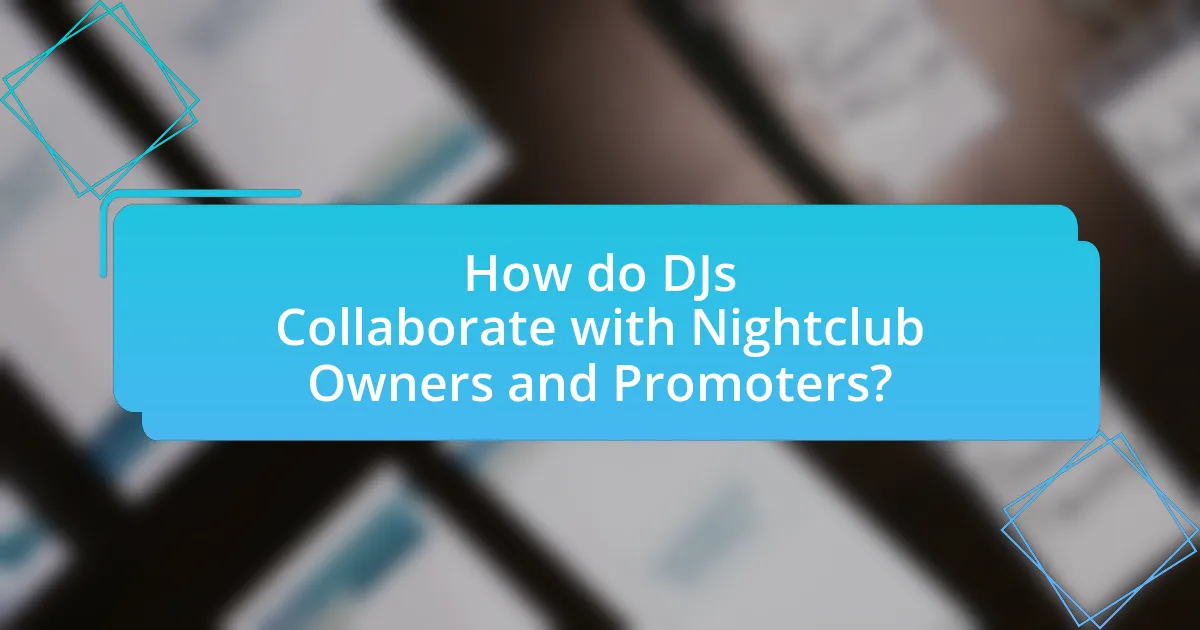
How do DJs Collaborate with Nightclub Owners and Promoters?
DJs collaborate with nightclub owners and promoters through strategic partnerships that involve booking agreements, promotional activities, and event planning. These collaborations often include DJs negotiating performance fees and scheduling, which are essential for ensuring a successful event. Additionally, nightclub owners and promoters rely on DJs to attract patrons, as their music selection and performance style can significantly influence the club’s atmosphere and attendance. For instance, a well-known DJ can draw large crowds, leading to increased revenue for the venue. This symbiotic relationship is further supported by marketing efforts, where DJs promote events through their social media channels, enhancing visibility and engagement.
What are the key factors in a DJ’s relationship with nightclub management?
The key factors in a DJ’s relationship with nightclub management include communication, mutual respect, and alignment of goals. Effective communication ensures that both parties understand expectations regarding performance, music selection, and event promotion. Mutual respect fosters a collaborative environment where the DJ feels valued and management recognizes the DJ’s artistic contributions. Alignment of goals, such as audience engagement and financial success, is crucial for a harmonious partnership. These factors are supported by industry practices where successful clubs often report higher satisfaction and retention rates among DJs when these elements are prioritized.
How do DJs negotiate their contracts and fees?
DJs negotiate their contracts and fees by assessing their market value, understanding the event’s budget, and leveraging their experience and reputation. They typically begin by researching industry standards for fees based on factors such as location, event type, and duration. DJs often present a clear breakdown of their services, including performance time, equipment provided, and any additional costs, which helps justify their fee.
Furthermore, they may engage in discussions with promoters or venue owners to establish terms that reflect their worth while remaining flexible to accommodate the client’s budget constraints. This negotiation process is often supported by data from previous gigs, testimonials, and their social media presence, which can enhance their bargaining position.
What role do DJs play in marketing and promoting events?
DJs play a crucial role in marketing and promoting events by leveraging their influence and fan base to attract attendees. Their established reputation and ability to create engaging experiences draw crowds, making them key figures in event promotion. For instance, a study by the International Music Summit in 2020 highlighted that events featuring well-known DJs can see attendance increases of up to 50% compared to those without. Additionally, DJs often utilize social media platforms to promote events, sharing mixes and engaging with fans, which amplifies event visibility and drives ticket sales.
How do DJs contribute to the overall branding of a nightclub?
DJs significantly contribute to the overall branding of a nightclub by curating unique musical experiences that align with the venue’s identity. Their selection of tracks and performance style directly influences the atmosphere, attracting specific demographics and enhancing the club’s reputation. For instance, a DJ known for electronic dance music can position a nightclub as a premier destination for that genre, thereby establishing a strong brand association. Additionally, successful DJs often have a loyal following, which can drive foot traffic and increase social media visibility for the nightclub, further solidifying its brand presence in the nightlife scene.
What strategies do DJs use to enhance a nightclub’s reputation?
DJs enhance a nightclub’s reputation by curating unique musical experiences that resonate with the audience. They achieve this through skillful mixing, selecting tracks that create an engaging atmosphere, and adapting their sets to the crowd’s energy. For instance, renowned DJs often incorporate popular tracks and emerging genres to attract diverse patrons, thereby increasing foot traffic and word-of-mouth promotion. Additionally, DJs frequently collaborate with other artists and influencers, which can elevate the club’s profile within the music community. This strategy is supported by the fact that clubs featuring well-known DJs often see increased attendance and media coverage, reinforcing their status in the nightlife scene.
How does a DJ’s personal brand influence their partnership with venues?
A DJ’s personal brand significantly influences their partnership with venues by enhancing the venue’s appeal and attracting a specific audience. A strong personal brand, characterized by a unique style, consistent image, and a loyal following, can lead to increased ticket sales and higher foot traffic for the venue. For instance, DJs like Calvin Harris and Tiësto have cultivated distinct brands that not only draw fans but also align with the marketing strategies of high-profile venues, resulting in lucrative partnerships. This symbiotic relationship benefits both parties, as venues leverage the DJ’s brand to enhance their reputation while DJs gain access to prime performance spaces that elevate their visibility and career.
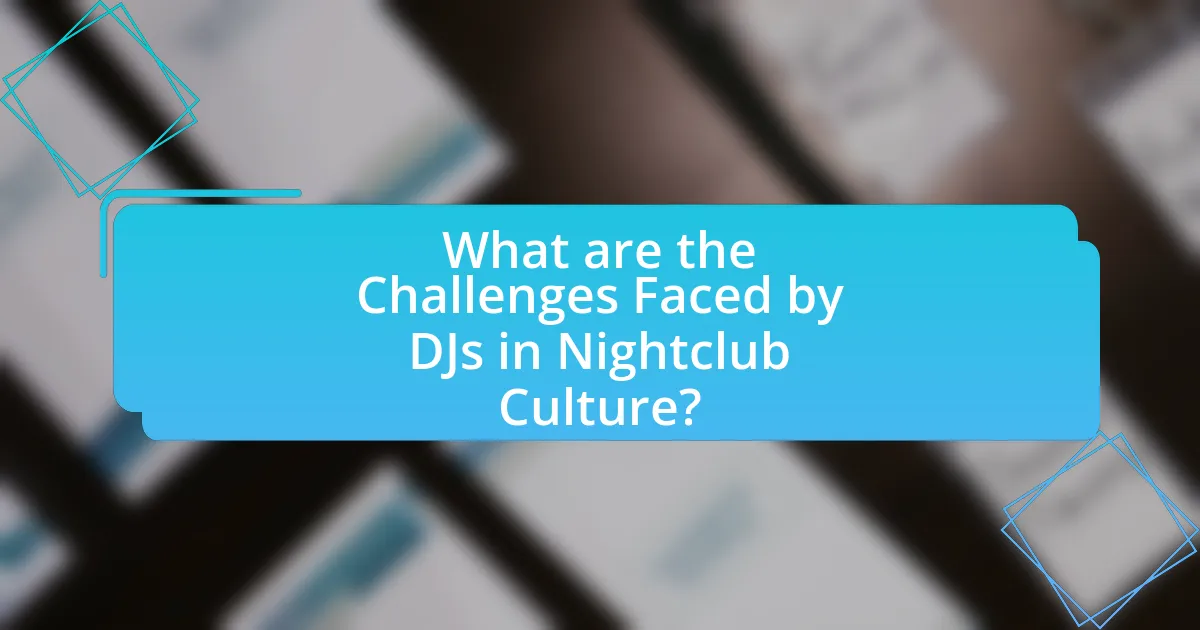
What are the Challenges Faced by DJs in Nightclub Culture?
DJs in nightclub culture face several challenges, including intense competition, the pressure to constantly innovate, and the need to manage audience expectations. The competitive landscape is marked by numerous DJs vying for limited performance slots, making it essential for DJs to differentiate themselves through unique styles and sets. Additionally, the pressure to keep up with evolving music trends and technology requires DJs to continuously adapt and innovate their performances. Managing audience expectations is also critical, as DJs must read the crowd and curate a set that resonates with diverse tastes while maintaining energy levels throughout the night. These challenges highlight the demanding nature of a DJ’s role in shaping the nightclub experience.
What common obstacles do DJs encounter in their careers?
DJs commonly encounter obstacles such as competition, financial instability, and the challenge of staying relevant in a rapidly changing music industry. Competition is fierce, with many aspiring DJs vying for the same gigs, making it difficult to secure consistent work. Financial instability often arises from the unpredictable nature of gigs and the need for significant investment in equipment and promotion. Additionally, the music industry evolves quickly, requiring DJs to continuously adapt to new trends and technologies to maintain their audience and relevance. These challenges are well-documented in industry reports, highlighting the pressures faced by DJs in their careers.
How do changing music trends affect a DJ’s relevance?
Changing music trends significantly affect a DJ’s relevance by determining their ability to connect with audiences and remain competitive in the industry. As musical styles evolve, DJs who adapt to these trends can maintain their popularity and influence, while those who resist change may find themselves less sought after. For instance, the rise of electronic dance music (EDM) in the early 2010s led to a surge in demand for DJs who could mix and produce within that genre, resulting in increased bookings and visibility for those who embraced it. Conversely, DJs who continued to focus on outdated genres risked losing their audience and relevance in a rapidly changing musical landscape.
What challenges arise from competition among DJs?
Competition among DJs leads to several challenges, including market saturation, pressure to innovate, and the struggle for recognition. Market saturation occurs when numerous DJs compete for the same audience, making it difficult for individual artists to stand out. This environment creates pressure to constantly innovate in terms of music selection, mixing techniques, and performance styles to attract and retain fans. Additionally, the struggle for recognition can result in DJs feeling compelled to engage in aggressive marketing tactics or collaborations, which may not align with their artistic vision. These factors collectively contribute to a highly competitive landscape that can impact the quality of performances and the overall nightclub culture.
How do DJs navigate the pressures of live performances?
DJs navigate the pressures of live performances by employing a combination of preparation, mental resilience, and audience engagement strategies. Preparation involves extensive practice and familiarity with their music library, allowing DJs to adapt to the crowd’s energy and preferences in real-time. Mental resilience is crucial, as DJs often face anxiety and performance pressure; techniques such as visualization and mindfulness can help them maintain focus and composure. Audience engagement strategies, including reading the crowd’s reactions and responding with appropriate track selections, enable DJs to create a dynamic atmosphere that enhances the overall experience. These methods collectively contribute to a successful live performance, as evidenced by the high-energy environments often reported in club settings, where skilled DJs can elevate the mood and keep the audience engaged.
What strategies do DJs use to manage performance anxiety?
DJs manage performance anxiety through various strategies, including preparation, visualization, and mindfulness techniques. Preparation involves thorough practice and familiarization with the setlist, which builds confidence and reduces uncertainty. Visualization techniques allow DJs to mentally rehearse their performance, envisioning a successful set and positive audience reactions, which can alleviate anxiety. Mindfulness practices, such as deep breathing and grounding exercises, help DJs stay present and focused during their performance, minimizing distractions and nervousness. These strategies are supported by psychological research indicating that mental rehearsal and mindfulness can significantly reduce anxiety levels in performers.
How do DJs handle technical difficulties during a set?
DJs handle technical difficulties during a set by quickly troubleshooting equipment issues and maintaining audience engagement. When faced with problems such as equipment failure or sound issues, DJs often have backup gear ready, like extra cables or a secondary laptop, to minimize downtime. They may also use their skills to transition to a different track or mix to keep the energy up while resolving the issue. This adaptability is crucial, as a study by the University of Southern California highlights that audience perception of a DJ’s professionalism is significantly influenced by their ability to manage unexpected challenges effectively.
What are some best practices for aspiring DJs in nightclub culture?
Aspiring DJs in nightclub culture should focus on building a strong music library, mastering technical skills, and networking effectively. A diverse music library allows DJs to cater to different audiences and adapt to various club atmospheres, which is crucial for maintaining energy on the dance floor. Mastering technical skills, including beatmatching and mixing, is essential for delivering seamless performances that engage the crowd. Networking with other DJs, promoters, and venue owners can lead to more gig opportunities and collaborations, which are vital for career growth in the competitive nightclub scene. These practices are supported by the fact that successful DJs often emphasize the importance of adaptability and community connections in their careers.
How can new DJs build their network within the industry?
New DJs can build their network within the industry by actively participating in local music events and collaborating with other artists. Engaging in these activities allows DJs to meet industry professionals, gain exposure, and establish relationships that can lead to future opportunities. For instance, attending and performing at open mic nights, music festivals, and club events facilitates direct interaction with peers and potential mentors. Additionally, utilizing social media platforms like Instagram and SoundCloud to showcase their work and connect with other DJs and producers can significantly enhance their visibility and networking potential. Research indicates that 70% of job opportunities in the music industry arise from networking, underscoring the importance of building connections for career advancement.
What resources are available for DJs to improve their skills?
DJs can improve their skills through various resources, including online courses, tutorials, and software tools. Platforms like MasterClass and Skillshare offer structured lessons from experienced DJs, while YouTube hosts countless free tutorials covering techniques and equipment usage. Additionally, software such as Serato and Traktor provides practice environments for mixing and beatmatching. According to a survey by DJ TechTools, 70% of DJs reported that online resources significantly enhanced their skills, demonstrating the effectiveness of these tools in professional development.

